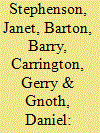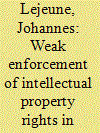| Srl | Item |
| 1 |
ID:
098686


|
|
|
|
|
| Publication |
2010.
|
| Summary/Abstract |
Achieving a 'step-change' in energy efficiency behaviours will require enhanced knowledge of behavioural drivers, and translation of this knowledge into successful intervention programmes. The 'Energy Cultures' conceptual framework aims to assist in understanding the factors that influence energy consumption behaviour, and to help identify opportunities for behaviour change. Building on a history of attempts to offer multi-disciplinary integrating models of energy behaviour, we take a culture-based approach to behaviour, while drawing also from lifestyles and systems thinking. The framework provides a structure for addressing the problem of multiple interpretations of 'behaviour' by suggesting that it is influenced by the interactions between cognitive norms, energy practices and material culture.
The Energy Cultures framework is discussed in the context of a New Zealand case study, which demonstrates its development and application. It has already provided a basis for cross-disciplinary collaboration, and for multi-disciplinary research design, and has provided insights into behavioural change in a case study community. As the conceptual basis of a 3-year research project, the framework has further potential to identify clusters of 'energy cultures' - similar patterns of norms, practices and/or material culture - to enable the crafting of targeted actions to achieve behaviour change.
|
|
|
|
|
|
|
|
|
|
|
|
|
|
|
|
| 2 |
ID:
131643


|
|
|
|
|
| Publication |
2014.
|
| Summary/Abstract |
The discrepancy between de jure and de facto protection of intellectual property rights in China remains a heatedly debated topic. Unfortunately, political motivations have distorted the debate from its very beginning, which has not only resulted in a tendency for the different explanations to be played off against each other, but has also reinforced their specific flaws and biases. This study addresses these problems by advancing and integrating the three main explanatory frameworks for explaining the situation. The resulting integrated framework finds that structural factors such as bureaucratic fragmentation and political decentralization matter most in practical terms, but their durability cannot be understood without putting them into context. The findings also suggest that, contrary to most predictions, the future development of intellectual property protection in China might not follow the path laid down by other countries that have modernized in the past.
|
|
|
|
|
|
|
|
|
|
|
|
|
|
|
|